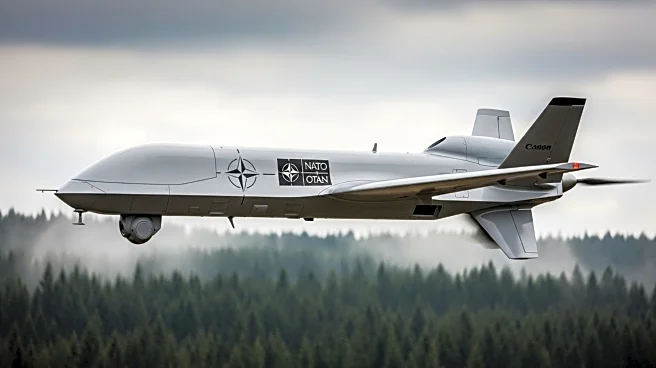What's Happening?
Russian drones entered Polish airspace, leading to heightened tensions and testing NATO's commitment to security in the region. Poland's Prime Minister Donald Tusk reported 19 airspace violations, with three drones shot down by Polish jets, supported by Dutch and Italian aircraft. The incident has sparked debate over whether the incursion was accidental or deliberate, with some experts suggesting reconnaissance purposes and others viewing it as a provocation. The drones flew near Rzeszow airport, a key hub for aid to Ukraine, raising concerns about Russia's intentions.
Why It's Important?
The drone incursion into Poland is significant as it challenges NATO's ability to respond to potential threats from Russia. It highlights the ongoing tensions between Russia and NATO countries, particularly in the context of the Ukraine conflict. The incident may influence NATO's strategic decisions and its approach to security in Eastern Europe. Poland's call to invoke Article 4 of the NATO treaty underscores the seriousness of the situation, potentially leading to discussions on collective defense measures. The event also tests the resolve of European nations and the U.S. in maintaining a united front against Russian aggression.
What's Next?
Poland is expected to review the incident and share findings with NATO allies, which could lead to increased military readiness and strategic planning. The U.S. response will be closely watched, as President Trump's ambiguous stance on Russia adds uncertainty to the situation. European leaders may push for stronger defense measures, including airspace protection over Ukraine, although concerns about accidental confrontations with Russia remain. The incident could prompt NATO to reassess its defense strategies and enhance its deterrence capabilities in the region.
Beyond the Headlines
The drone incursion raises ethical and legal questions about airspace violations and the use of drones in international conflicts. It also reflects the broader geopolitical struggle between Russia and Western nations, with implications for global security and diplomatic relations. The event may influence future discussions on international law and the sovereignty of nations, particularly in conflict zones.










